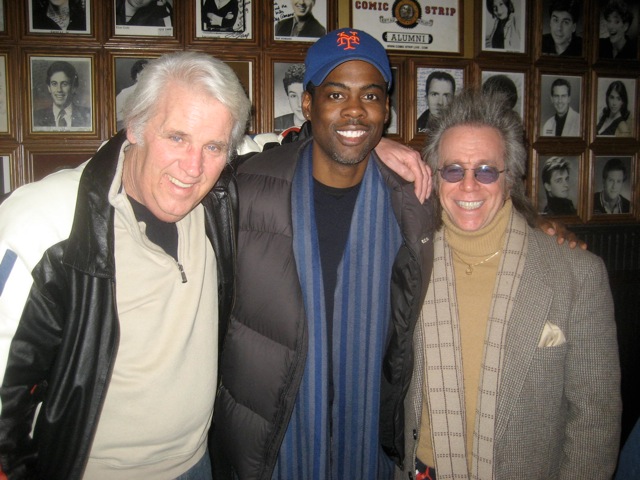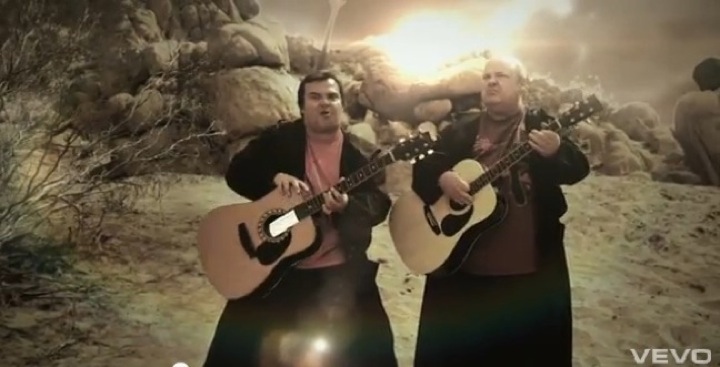At the SPIKE TV tribute to Eddie Murphy in November, Adam Sandler praised Murphy’s first stand-up special, Delirious, and acknowledged that he went to great lengths to be just like Eddie.
“I tried to do everything he did in his career,” Sandler said. “I started doing stand-up at the world-famous Comic Strip in New York City like he did. I got on Saturday Night Live like he did. I got the same manager like he did. And then, when I became a big star, I fired the same manager like he did. (laughs) I love you Richie, and so does Eddie. That manager actually said to me the same thing he said to Eddie, but he changed the racial slur to an anti-Semetic slur, so…
That manager, that Richie, is Richie Tienken, who opened the Comic Strip in NYC’s Upper East Side on June 1, 1976. Back then, the only other comedy clubs in NYC were the original Improvisation and the original Catch a Rising Star. Both of those clubs long since closed.
The Comic Strip, however, continues going strong with live comedy shows every night of the week. Sandler and Murphy weren’t the only superstars to start their careers there. Jerry Seinfeld. Chris Rock. Ray Romano. Paul Reiser. Carol Leifer. George Wallace. And many more.
Thirty-six years later, Tienken and Jeffrey Gurian have compiled a grand oral history of the Comic Strip in the book, “Make ‘Em Laugh.” Chris Rock wrote the introduction.
Although it’s an oral history of the club from 1976 to today, the book isn’t structured like a typical oral history, instead separating out each comedian’s memories and experiences with the Comic Strip and his or her start in stand-up comedy.
Here are some excerpts along with video clips from the early 1980s, when they were young and not yet famous. Even back then, they knew how to “Make ‘Em Laugh.”
JERRY SEINFELD
Seinfeld auditioned for the Comic Strip on June 17, 1976, just a couple of weeks after the club opened its doors. His audition letter hangs on the walls in the lobby in lieu of his headshot.
“You know, I even remember where I parked that day I auditioned. I drove in from Massapequa, and I parked right near the avenue, on 82nd Street. I was just one block north, and I remember I was on the north side of the street, and I remember everything about it. As a matter of fact, I think that was the last time anyone every found a spot around here.
But it was certainly the last time I ever auditioned as a comedian for anything. Once you became established here, you were golden. You could go anywhere.”
PAUL REISER
“This club always treated everybody better, and they nurtured you, like Richie giving you thoughts, and Lucien giving you comments, and even Bob Wachs was helpful. And I had been hoping I’d hate comedy so it would have made my life simple, and it would have been easy to go into my dad’s business. But whether I had a good night or a bad night onstage, I still couldn’t wait to get back onstage the next night.
I remember in the beginning, when I was living in my parents’ house in Jersey, I would call up looking for a spot, and the other comics used to tell me I had to hang out. Even Seinfeld used to tell me that, and I didn’t understand it. I was like, ‘I’m working in an office from eight-thirty in the morning until six. I don’t wanna start hanging out in some club just to bullshit with everybody.’
And Seinfeld described it as being just one of these intangibles. You become part of the community, and sure enough that was exactly right, ’cause if you were part of the community and if someone had a gig and couldn’t make it, they’d offer it to you.”
GEORGE WALLACE
“I thought I’d lose a lot of money when I finally left advertising, but The Comic Strip paid me back by putting me onstage and letting me be a comedian.
I was so excited to be there, I would help them seat people. I would do everything I could, ’cause I wasn’t doing anything else anyway. But thank God for Richie Tienken. He would put me on every night, and we all became friends, and of course I was there with Jerry Seinfeld and Larry Miller and Paul Reiser, who probably came along about a year later.”
GILBERT GOTTFRIED
“Now what I remember most about The Comic Strip is more so than the other clubs, it seemed like Jerry Seinfeld was the star of The Comic Strip. And it seemed like 99 percent of the comedians who were Comic Strip regulars would talk exactly like him, male or female. They all started sounding just like Jerry Seinfeld. Even the girls.
Now in those days, before anyone really knew who he was, I would go onstage and do imitations of Jerry, and the comics would be cracking up, but the audience would be scratching their heads trying to figure out who I was doing.
I remember one time a club owner said to me, ‘Why are you doing Seinfeld? Do someone that people actually know.’ I had been doing impressions since the time I started, when I was around fifteen.”
CHRIS ROCK
Before his infamous encounter with Eddie Murphy at the club…
“I auditioned and didn’t pass, but I just kept hanging out anyway. I just got to hang around a lot. People didn’t question me. I was younger than everybody and looked even younger than I actually was. If I had looked older, somebody would have probably said something, but because I looked so young, I had a very Henry Hill existence. And I knew to shut up.
Like now, and I don’t mean to sound like a snob, but sometimes I’ll come into a club and some kid’ll come up to me and say something like he’s a friend of mine, ‘Hey Chris,’ and whatever else he says, and try to start a conversation. And again, I don’t mean to sound like a snob, but when I was coming up, no one would even dare think of approaching Rodney Dangerfield. What are you crazy? Are you fuckin’ crazy? Only the club owner and a couple of headliners would approach the star. You can’t be a fucking kid and approach the star. You can’t just fuckin’ walk up to Robin Williams or someone like that. You didn’t do that in my day. So I knew my place. No one had to tell me that.
I just stayed out of the way. I didn’t bother anyone. And if I didn’t get stage time, it wasn’t that big a blow to me, ’cause I could always see guys who were funnier than me. And if not funnier, at least a better comedian than me. I totally rationalized it in my head: Dennis Wolfberg is funnier than me. Joe Bolster is a better comedian than me. Joe Bolster is still a better comedian than me.”
RAY ROMANO
Romano’s first paid gig was at The Comic Strip, and years later, the site of his biggest break.
“So I had been doing it for like eleven years now, and I was thinking that if it’s gonna happen, it should happen around now. And I was kinda getting a little discouraged ’cause it wasn’t happening, then the Letterman people, with Rob Burnett the producer, watched me do a half-hour.
I did it at the Strip, and the club was nice enough to let me do a whole half-hour before they agreed to give me a spot on Letterman. Lucien let me do it on a Saturday night with a packed house, and I got my Letterman spot. When it ended, I thought I had done pretty well, and I thought to myself, ‘If anyone’s thinking of giving me a development deal, if they see that, it should happen.’ And it didn’t happen right away.”
It happened a couple of weeks later, when Romano signed with Letterman and Burnett’s Worldwide Pants, and developed Everybody Loves Raymond. Here’s a link to Romano’s video interview with Gurian and Tienken for the book.
ADAM SANDLER
From 1989:
EDDIE MURPHY
Warming up for his Delirious special in 1983:
“Make ‘Em Laugh” also features interviews with Alan Colmes, Paul Provenza, Jackie Martling, Susie Essman, Tony D’Andrea, Eddie Brill, Rick Overton, Wayne Federman, D.F. Sweedler, Joe Bolster, Colin Quinn, Lewis Black, Billy Crystal, Lisa Lampanelli, Jim Breuer, Pete Correale, Adam Ferrara, Sherrod Small, Tony Rock, Pete Dominick, Jeffrey Ross, Jim Gaffigan, Judah Friedlander, manager Rory Rosegarten, landlord David Eberhart and Catch owner Rick Newman.



4 thoughts on ““Make ‘Em Laugh”: Famous comedians reminisce about their beginnings at the Comic Strip”
Comments are closed.